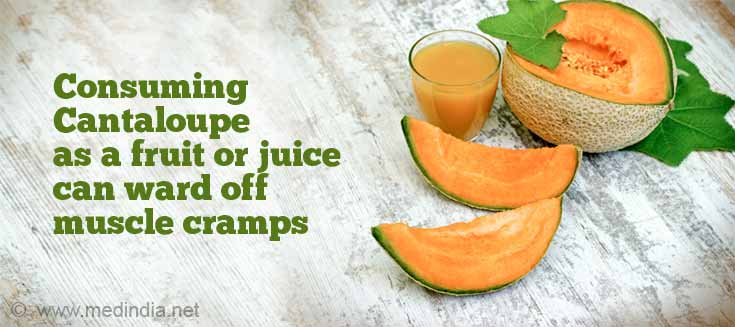About
Eating cantaloupes, which are powerhouses of health, at the same time deliciously refreshing and fragrant is ultimately blissful.
Muskmelon is another name given to cantaloupes, which belong to the Cucurbitaceae family; it has a peak season from June to August. This round or oval shaped fruit, with a rough and scaly skin, is orange-yellow in color with high water content. It has a fleshy hollow core in the center with a mesh full of melon seeds. These seeds are dried and also eaten after peeling them, for their high nutritive value.
Cantaloupes are rich in vitamin A, vitamin C, vitamin B6, folate, potassium, magnesium, thiamine, pantothenic acid, superoxide dismutase and dietary fiber. As it is rich in beta-carotene and vitamin C, it helps prevent many degenerative diseases.

Health Benefits of Cantaloupes/Muskmelons
Cantaloupes are good for diabetic nephropathy – which is a progressive kidney disorder where the kidney is damaged. An extract of cantaloupe called oxykine is very effective in arresting the damage.
This fruit has superoxide dismutase which relieves stress and lowers blood pressure. The potassium in the fruit keeps the heartbeat regularized. Potassium controls blood pressure and prevents hypertension. The sodium content in the fruit works as an anticoagulant, which controls viscosity and prevents clotting of blood.
Cantaloupes are rich sources of folic acid and help women conceive. The folic acid present is very important in regeneration of dead cells – especially, for pregnant women. The high content of folate prevents neural tube disorders in the fetus. It greatly improves the healthy elasticity of skin and prevents wrinkles.
Pregnant women are given supplements of folic acid – in the same way, cantaloupes are very beneficial during pregnancy as they have high folate content. It keeps water retention at bay by flushing out extra sodium from the body.
Cantaloupes are rich in vitamin C which is an anti-oxidant and prevents free radicals from damaging cells, thus fightingcancer. The fruit also strengthens the immune system while stimulating and increasing the white blood cells which help in destroying viruses and bacteria. It prevents premature aging.

Beta carotene present in cantaloupes turns to vitamin A. The natural vitamin A is absorbed by the body and delays the onset of cataracts, is vital in maintaining healthy eyesight. By having a cup of cantaloupes regularly you can actually prevent or delay cataracts.
Those with sleep disorders will find a difference by eating a cup of cantaloupes, as it relaxes nerves and muscles and helps insomniacs to sleep better.
Eating cantaloupe helps when women have menstrual problems - it stops heavy flow and clots while easing menstrual cramps. Muscle cramps also ease out with the fruit or juice.

Lung health benefits with a diet of cantaloupes. When people who are exposed smoke, the carcinogens create a deficiency of vitamin A which is reversed by the fruit. Sometimes smokers who have already damaged their lungs, a regular diet of cantaloupes can rejuvenate the lungs over a period of time and reduce the risk of emphysema.
The natural nutrients and minerals form a synergy to help the body recover from nicotine withdrawal when a person is trying to quit smoking.
This fruit is rich in adenosine, which is a compound given to patients with heart disease, as it has blood thinning properties and thus preventing heart attacks.
It is ideal to eat the fruit during times of stress as it increases the flow of oxygen to the brain making you more relaxed and focused.
It is an ideal substitute for a high-calorie snack as 1 cup of diced cantaloupe has just 50 calories – it has 89% water and is best in summer to combat dehydration.
Some water can be added to fresh-squeezed fruit and can be had as a refreshing drink or you can even add some peaches to it and blend in a juicer for a delicious drink. Dipping sliced cantaloupe in a bowl of curd is a great way to add zinc to the body.










